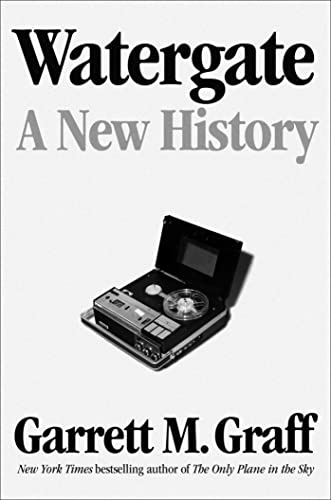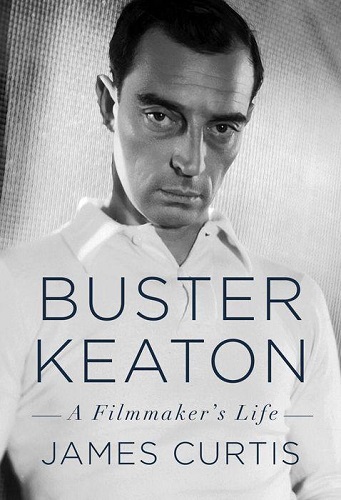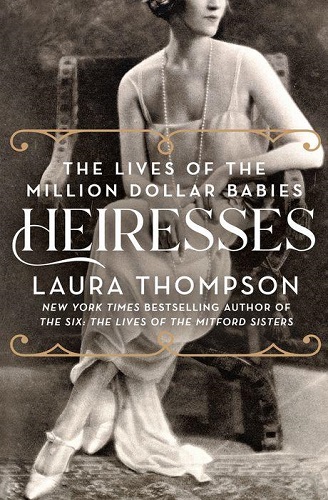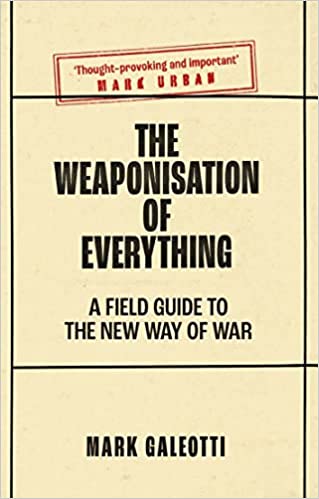
WATERGATE: A NEW HISTORY
by Garrett M. Graff
From the New York Times bestselling author of The Only Plane in the Sky, the first definitive narrative history of Watergate, exploring the full scope of the scandal through the politicians, investigators, journalists, and informants who made it the most influential political event of our modern era.
In the early hours of June 17, 1972, a security guard named Frank Wills entered six words into the log book of the Watergate office complex that would change the course of history: 1:47 AM Found tape on doors; call police.
The five men—Virgilio Gonzalez, Bernard Baker, James McCord, Eugenio Martinez, and Frank Sturgis—arrested and charged with attempted burglary that night kicked off the biggest scandal in American politics. Over the next two years, that single thwarted break-in would lead to dozens more arrests, an alleged kidnapping, FBI and congressional investigations, a Senate hearing, and bombshell testimonies from the highest levels of political power that ultimately would reveal a cover-up, sink a vice-president and a half-dozen Cabinet officials, lead to the jailing of an FBI director, end a presidency, and alter our views of moral authority and leadership. Watergate defined a decade, and a nation.
And yet, recent revelations like the release of more Nixon tapes and the identity of “Deep Throat” himself, means that the full story has never been told from start to finish.
Now, in Watergate, award-winning journalist and bestselling author Garrett M. Graff explores the full sweep of the scandal that would come to define all others, from the release of The Pentagon Papers in 1971—the first signs of trouble for the White House—and the 1972 DNC break-in to the denials, trials, hearings, and eventual downfall of the Nixon Administration three years later—the implications of which we still feel today. Watergate, Graff shows, is a much bigger and much weirder story than America remembers. Along the way, he introduces a vibrant cast of characters, including the psychologically tortured President and his doomed inner circle, special prosecutors Archibald Cox and Leon Jaworski, the Congressional committees led by Sam Ervin and Peter Rodino, groundbreaking reporters Bob Woodward and Carl Bernstein, and Mark Felt, an Associate Director of the FBI who would conceal his identity for decades behind the name “Deep Throat,” as well a host of others whose involvement has been forgotten—from Yankees owner George Steinbrenner to a young impeachment aide named Hillary Rodham.
Grippingly told, meticulously researched, and featuring new details and never-told stories, Watergate is the defining, behind-the-scenes look at the era that upended the course of American politics—and life—as we knew it.

BUSTER KEATON: A FILMMAKER'S LIFE
by James Curtis
From acclaimed cultural and film historian James Curtis—a major biography, the first in more than two decades, of the legendary comedian and filmmaker who elevated physical comedy to the highest of arts and whose ingenious films remain as startling, innovative, modern—and irresistible—today as they were when they beguiled audiences almost a century ago.
“It is brilliant—I was totally absorbed, couldn’t stop reading it and was very sorry when it ended.”—Kevin Brownlow
It was James Agee who christened Buster Keaton “The Great Stone Face.” Keaton’s face, Agee wrote, “ranked almost with Lincoln’s as an early American archetype; it was haunting, handsome, almost beautiful, yet it was also irreducibly funny. Keaton was the only major comedian who kept sentiment almost entirely out of his work and . . . he brought pure physical comedy to its greatest heights.”
Mel Brooks: “A lot of my daring came from Keaton.”
Martin Scorsese, influenced by Keaton’s pictures in the making of Raging Bull: “The only person who had the right attitude about boxing in the movies for me,” Scorsese said, “was Buster Keaton.”
Keaton’s deadpan stare in a porkpie hat was as recognizable as Charlie Chaplin’s tramp and Harold Lloyd’s straw boater and spectacles, and, with W. C. Fields, the four were each considered a comedy king–but Keaton was, and still is, considered to be the greatest of them all.
His iconic look and acrobatic brilliance obscured the fact that behind the camera Keaton was one of our most gifted filmmakers. Through nineteen short comedies and twelve magnificent features, he distinguished himself with such seminal works as Sherlock Jr., The Navigator, Steamboat Bill, Jr., The Cameraman, and his masterpiece, The General.
Now James Curtis, admired biographer of Preston Sturges (“definitive”—Variety), W. C. Fields (“by far the fullest, fairest and most touching account we have yet had. Or are likely to have”—Richard Schickel, front page of The New York Times Book Review), and Spencer Tracy (“monumental; definitive”—Kirkus Reviews), gives us the richest, most comprehensive life to date of the legendary actor, stunt artist, screenwriter, director—master.

HEIRESSES
by Laura Thompson
New York Times bestselling author Laura Thompson returns with Heiresses, a fascinating look at the lives of heiresses throughout history and the often tragic truth beneath the gilded surface.
Heiresses: surely they are among the luckiest women on earth. Are they not to be envied, with their private jets and Chanel wardrobes and endless funds? Yet all too often those gilded lives have been beset with trauma and despair. Before the 20th century a wife’s inheritance was the property of her husband, making her vulnerable to kidnap, forced marriages, even confinement in an asylum. And in modern times, heiresses fell victim to fortune-hunters who squandered their millions.
Heiresses tells the stories of these million dollar babies: Mary Davies, who inherited London’s most valuable real estate, and was bartered from the age of twelve; Consuelo Vanderbilt, the original American “Dollar Heiress”, forced into a loveless marriage; Barbara Hutton, the Woolworth heiress who married seven times and died almost penniless; and Patty Hearst, heiress to a newspaper fortune who was arrested for terrorism. However, there are also stories of independence and achievement: Angela Burdett-Coutts, who became one of the greatest philanthropists of Victorian England; Nancy Cunard, who lived off her mother’s fortune and became a pioneer of the civil rights movement; and Daisy Fellowes, elegant linchpin of interwar high society and noted fashion editor.
Heiresses is about the lives of the rich, who―as F. Scott Fitzgerald said―are ‘different’. But it is also a bigger story about how all women fought their way to equality, and sometimes even found autonomy and fulfillment.

THE GENESIS MACHINE
by Amy Webb & Andrew Hessel
The next frontier in technology is inside our own bodies.
Synthetic biology will revolutionize how we define family, how we identify disease and treat aging, where we make our homes, and how we nourish ourselves. This fast-growing field—which uses computers to modify or rewrite genetic code—has created revolutionary, groundbreaking solutions such as the mRNA COVID vaccines, IVF, and lab-grown hamburger that tastes like the real thing. It gives us options to deal with existential threats: climate change, food insecurity, and access to fuel.
But there are significant risks.
Who should decide how to engineer living organisms? Whether engineered organisms should be planted, farmed, and released into the wild? Should there be limits to human enhancements? What cyber-biological risks are looming? Could a future biological war, using engineered organisms, cause a mass extinction event?
Amy Webb and Andrew Hessel’s riveting examination of synthetic biology and the bioeconomy provide the background for thinking through the upcoming risks and moral dilemmas posed by redesigning life, as well as the vast opportunities waiting for us on the horizon.

THE QUIET BEFORE
by Gal Beckerman
A provocative, incisive look at the building of social movements—from the 1600s to the present—and how current technology is undermining them
“A bravura work of scholarship and reporting, featuring amazing individuals and dramatic events from seventeenth-century France to Rome, Moscow, Cairo, and contemporary Minneapolis.”—Louis Menand, author of The Free World
We tend to think of revolutions as loud: frustrations and demands shouted in the streets. But the ideas fueling them have traditionally been conceived in much quieter spaces, in the small, secluded corners where a vanguard can whisper among themselves, imagine alternate realities, and deliberate about how to achieve their goals. This extraordinary book is a search for those spaces, over centuries and across continents, and a warning that—in a world dominated by social media—they might soon go extinct.
Gal Beckerman, an editor at The New York Times Book Review, takes us back to the seventeenth century, to the correspondence that jump-started the scientific revolution, and then forward through time to examine engines of social change: the petitions that secured the right to vote in 1830s Britain, the zines that gave voice to women’s rage in the early 1990s, and even the messaging apps used by epidemiologists fighting the pandemic in the shadow of an inept administration. In each case, Beckerman shows that our most defining social movements—from decolonization to feminism—were formed in quiet, closed networks that allowed a small group to incubate their ideas before broadcasting them widely.
But Facebook and Twitter are replacing these productive, private spaces, to the detriment of activists around the world. Why did the Arab Spring fall apart? Why did Occupy Wall Street never gain traction? Has Black Lives Matter lived up to its full potential? Beckerman reveals what this new social media ecosystem lacks—everything from patience to focus—and offers a recipe for growing radical ideas again.
Lyrical and profound, The Quiet Before looks to the past to help us imagine a different future.

TRUE STORY: WHAT REALITY TV SAYS ABOUT US
by Danielle J. Lindemann
A sociological study of reality TV that explores its rise as a culture-dominating medium―and what the genre reveals about our attitudes toward race, gender, class, and sexuality
What do we see when we watch reality television?
In True Story: What Reality TV Says About Us, the sociologist and TV-lover Danielle J. Lindemann takes a long, hard look in the “funhouse mirror” of this genre. From the first episodes of The Real World to countless rose ceremonies to the White House, reality TV has not just remade our entertainment and cultural landscape (which it undeniably has). Reality TV, Lindemann argues, uniquely reflects our everyday experiences and social topography back to us. Applying scholarly research―including studies of inequality, culture, and deviance―to specific shows, Lindemann layers sharp insights with social theory, humor, pop cultural references, and anecdotes from her own life to show us who we really are.
By taking reality TV seriously, True Story argues, we can better understand key institutions (like families, schools, and prisons) and broad social constructs (such as gender, race, class, and sexuality). From The Bachelor to Real Housewives to COPS and more (so much more!), reality programming unveils the major circuits of power that organize our lives―and the extent to which our own realities are, in fact, socially constructed.
Whether we’re watching conniving Survivor contestants or three-year-old beauty queens, these “guilty pleasures” underscore how conservative our society remains, and how steadfastly we cling to our notions about who or what counts as legitimate or “real.” At once an entertaining chronicle of reality TV obsession and a pioneering work of sociology, True Story holds up a mirror to our society: the reflection may not always be pretty―but we can’t look away.

BLACK AMERICAN REFUGEE
by Tiffanie Drayton
Named “most anticipated” book of February by Marie Claire, Essence, and A.V. Club
“A welcome addition to the literature on race in America…. Drayton has a powerful story and the voice to do it justice.”
—Kirkus Reviews
After following her mother to the US at a young age to pursue economic opportunities, one woman must come to terms with the ways in which systematic racism and resultant trauma keep the American Dream inaccessible to Black people.
In the early ’90s, young Tiffanie Drayton and her siblings left Trinidad and Tobago to join their mother in New Jersey, where she’d been making her way as a domestic worker, eager to give her children a shot at the American Dream. At first, life in the US was idyllic. But chasing good school districts with affordable housing left Tiffanie and her family constantly uprooted–moving from Texas to Florida then back to New Jersey. As Tiffanie came of age in the suburbs, she began to ask questions about the binary Black and white American world. Why were the Black neighborhoods she lived in crime-ridden, and the multicultural ones safe? Why were there so few Black students in advanced classes at school, if there were any advanced classes at all? Why was it so hard for Black families to achieve stability? Why were Black girls treated as something other than worthy?
Ultimately, exhausted by the pursuit of a “better life” in America, twenty-year old Tiffanie returns to Tobago. She is suddenly able to enjoy the simple freedom of being Black without fear, and imagines a different future for her own children. But then COVID-19 and widely publicized instances of police brutality bring America front and center again. This time, as an outsider supported by a new community, Tiffanie grieves and rages for Black Americans in a way she couldn’t when she was one.
An expansion of her New York Times piece of the same name, Black American Refugee examines in depth the intersection of her personal experiences and the broader culture and historical ramifications of American racism and global white supremacy. Through thoughtful introspection and candidness, Tiffanie unravels the complex workings of the people in her life, including herself, centering Black womanhood, and illuminating the toll a lifetime of racism can take. Must Black people search beyond the shores of the “land of the free” to realize emancipation? Or will the voices that propel America’s new reckoning welcome all dreamers and dreams to this land?

THE WEAPONISATION OF EVERYTHING
by Mark Galeotti
An engaging guide to the various ways in which war is now waged—and how to adapt to this new reality
Hybrid War, Grey Zone Warfare, Unrestricted War: today, traditional conflict—fought with guns, bombs, and drones—has become too expensive to wage, too unpopular at home, and too difficult to manage. In an age when America threatens Europe with sanctions, and when China spends billions buying influence abroad, the world is heading for a new era of permanent low-level conflict, often unnoticed, undeclared, and unending.
Transnational crime expert Mark Galeotti provides a comprehensive and ground-breaking survey of the new way of war. Ranging across the globe, Galeotti shows how today’s conflicts are fought with everything from disinformation and espionage to crime and subversion, leading to instability within countries and a legitimacy crisis across the globe. But rather than suggest that we hope for a return to a bygone era of “stable” warfare, Galeotti details ways of surviving, adapting, and taking advantage of the opportunities presented by this new reality.
Still Hot in Non-Fiction & Biography

THE BETRAYAL OF ANNE FRANK
by Rosemary Sullivan
A New York Times Bestseller
Less a mystery unsolved than a secret well kept…
Using new technology, recently discovered documents and sophisticated investigative techniques, an international team—led by an obsessed retired FBI agent—has finally solved the mystery that has haunted generations since World War II: Who betrayed Anne Frank and her family? And why?
Over thirty million people have read The Diary of a Young Girl, the journal teen-aged Anne Frank kept while living in an attic with her family and four other people in Amsterdam during World War II, until the Nazis arrested them and sent them to a concentration camp. But despite the many works—journalism, books, plays and novels—devoted to Anne’s story, none has ever conclusively explained how these eight people managed to live in hiding undetected for over two years—and who or what finally brought the Nazis to their door.
With painstaking care, retired FBI agent Vincent Pankoke and a team of indefatigable investigators pored over tens of thousands of pages of documents—some never before seen—and interviewed scores of descendants of people familiar with the Franks. Utilizing methods developed by the FBI, the Cold Case Team painstakingly pieced together the months leading to the infamous arrest—and came to a shocking conclusion.
The Betrayal of Anne Frank: A Cold Case Investigation is the riveting story of their mission. Rosemary Sullivan introduces us to the investigators, explains the behavior of both the captives and their captors and profiles a group of suspects. All the while, she vividly brings to life wartime Amsterdam: a place where no matter how wealthy, educated, or careful you were, you never knew whom you could trust.

TASTE
by Stanley Tucci
INSTANT NEW YORK TIMES BESTSELLER
Named a Notable Book of 2021 by NPR and The Washington Post
From award-winning actor and food obsessive Stanley Tucci comes an intimate and charming memoir of life in and out of the kitchen.
Stanley Tucci grew up in an Italian American family that spent every night around the kitchen table. He shared the magic of those meals with us in The Tucci Cookbook and The Tucci Table, and now he takes us beyond the savory recipes and into the compelling stories behind them.
Taste is a reflection on the intersection of food and life, filled with anecdotes about his growing up in Westchester, New York; preparing for and shooting the foodie films Big Night and Julie & Julia; falling in love over dinner; and teaming up with his wife to create meals for a multitude of children. Each morsel of this gastronomic journey through good times and bad, five-star meals and burned dishes, is as heartfelt and delicious as the last.
Written with Stanley’s signature wry humor, Taste is for fans of Bill Buford, Gabrielle Hamilton, and Ruth Reichl—and anyone who knows the power of a home-cooked meal.
